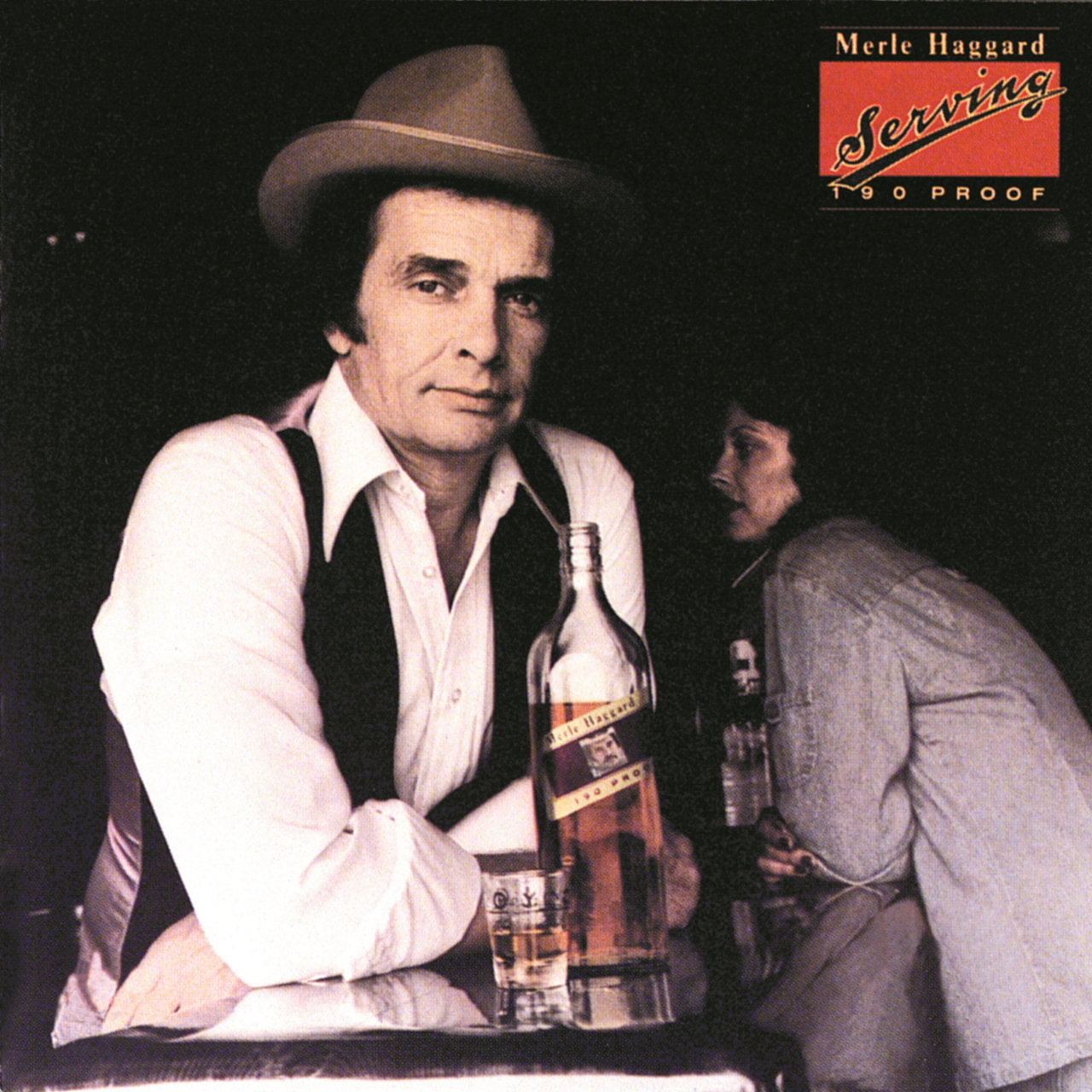【Dear Utol: Catfish Episode 46】
Merle Haggard,Dear Utol: Catfish Episode 46 1937–2016
In Memoriam

The cover of Serving 190 Proof, 1979.
Ever since I started editing The Paris Review, I’ve wished we could interview Merle Haggard. No songwriter means as much to me. Unfortunately, the Reviewdoesn’t have a series on the Art of Songwriting (and for good reasons), so for the past six years I just wished. Then last Friday, at a friend’s wedding, I met a country deejay named Rebecca Birmingham. We happened to start talking about Merle and how much his songs moved us both, how true they were to experience, how original they sound even now. We both knew he was in poor health, he’d been in poor health for years, but she had a friend who’d know how to get in touch … Four days later we got the news that he was dead.
The print headline of Haggard’s New York Times obituary called him “a poet of the common man.” He was that, certainly. When Merle released his first singles, in the early sixties, he had spent half his adult life in prison, and in his songs he wrote eloquently—for a mass audience—about being in prison, getting out of prison, and running from the law. My sister and I used to sing those songs with our father, pretty much from the time we could talk. I remember asking my father about the explosive refrain of “Mama Tried”: “I turned twenty-one in prison, doing life without parole.” I understood the words, but I found the past tense confusing and upsetting. Didn’t it mean the man singing was still in prison … and always would be? That refrain is the key to the song. It’s about having already been condemned to life. It is a line from beyond the grave.
As I got older, we sang together less and I listened to records more. Merle still had hits on the radio in those days—the late seventies and early eighties. These songs weren’t all about prison, or about growing up in the dust bowl and the oil fields. His 1979 LP, Serving 190 Proof, is not about the common man at all. “I live the kind of life most men only dream of” is how the first song, “Footlights,” begins:
I make my living writing songs and singing them.
But I’m forty-one years old, and I ain’t got no place to go when it’s over,
So I’ll hide my age and take the stage
And try to kick the footlights out again.
The songs in Serving 190 Proof are about losing your youth, masking and self-medicating depression, going to a shrink, watching a marriage unravel on the road, feeling crushed by failure and success equally. There are conventional country songs on the album, too. But Merle had found a new vein. He would spend the eighties recording a kind of confessional verse like nothing that came before. The women in his songs became particular people. The words were no longer strictly “country”:
The first time we met is a favorite memory of mine.
They say time changes all it pertains to,
But your memory is stronger than time.
The songs became, for a kid, almost too sad to listen to. But hard to turn away from, like a secret you don’t want to hear.
Serving 190 Proof came out when I was six. A year later my parents split up. My father, it occurs to me now, was forty-one at the time. Now I’m forty-two, and when I listen to those songs again, what I notice is how concerned they were with adult loneliness—not romantic suffering, exactly, not heartache, but the feeling of being condemned, helpless, consumed with regret. The feeling was somehow, in the songs, specifically male and unspeakable, unshareable. The songs were a keyhole into a cell.
Last week, at that wedding, I realized we didn’t need to invent a new genre for Merle. His art was the Art of Nonfiction. So I assigned the interview that very night, to a stranger—just six years late.
You can listen here to Rebecca’s tribute to Merle on WFMU. It features cuts from the 1972 LP Let Me Tell You About a Song, where he sketches the genesis of some of his early work. For listeners who are interested, I recommend his autobiographies, My House of Memories and Sing Me Back Home, and Nicholas Dawidoff’s 1997 profile in In the Country of Country.
Lorin Stein is editor of The Paris Review.
Search
Categories
Latest Posts
Kid at Disneyland nabs EXCLUSIVE 9
2025-06-26 17:47Apple won't be funding GOP convention due to Trump, report says
2025-06-26 16:39Federal judge blocks release of plans for 3D
2025-06-26 16:17Amazon Fire TV Stick 4K deal: Get 40% off
2025-06-26 15:46Popular Posts
Patched Desktop PC: Meltdown & Spectre Benchmarked
2025-06-26 18:07These new 'Orange is the New Black' characters deserve a spinoff
2025-06-26 16:29Catch up on Twitter's top tweets from the past week
2025-06-26 15:5913 Good Games You Can Play on Laptops and Budget PCs
2025-06-26 15:39Featured Posts
3D printed guns: an explainer
2025-06-26 17:09San Francisco stages a kiss
2025-06-26 16:14Shop the Google Pixel Pro 9 for $200 off at Amazon
2025-06-26 15:34Popular Articles
Trump's new tariff plan spares some smartphones, laptops
2025-06-26 17:43Reddit hack exposes old private messages
2025-06-26 17:29Tim Cook tosses light shade at Trump's tariffs during earnings call
2025-06-26 17:13How a California wildfire caused an honest
2025-06-26 16:15The Made in America iPhone: How much would it cost?
2025-06-26 15:39Newsletter
Subscribe to our newsletter for the latest updates.
Comments (88434)
Sharing Information Network
Trump's new tariff plan spares some smartphones, laptops
2025-06-26 18:11Inspiration Information Network
An obituary for the loser of the 'Game of Thrones' bastard bowl
2025-06-26 17:55Information Information Network
Enjoy Kim Kardashian's blood curdling screams on a roller coaster
2025-06-26 17:28Inspiration Information Network
The Academy challenged Twitter users to summarize movies in five words
2025-06-26 17:01Information Information Network
Anker raises Amazon prices amid US tariffs
2025-06-26 16:10